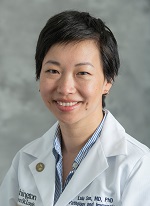Member Spotlight: Lulu Sun
 1. What is your name?
1. What is your name?
Lulu Sun, MD PhD
2. What is your professional title?
Assistant Professor, Department of Pathology and Immunology at Washington University in St. Louis.
3. How did you decide to enter the field/what (or who) brought you into the field?
For surgical pathology, I was initially interested because my PI during my PhD was a pathologist. After doing my medical student elective in pathology, I knew it was what I wanted to do. It took me a little longer to find my interest in molecular pathology. I had some experience with PCR / lab testing / sequencing technology as a part of my research. Later in residency, I felt like most of the interesting developments in the field were happening in Molecular Pathology, and it seemed important to have a solid background in Molecular. So I did the fellowship. Even then, I hadn’t fully committed to it as a career.
It was when I went to my first AMP meeting that I decided I actually wanted to be a molecular pathologist and be more involved in the molecular division. I just felt like I found my people. I remember thinking that they were asking questions that I wanted to ask, and talking about things that I found important and interesting.
4. What do you do? How would you describe your role?
My time is divided between surgical pathology (with a focus on breast / gynecologic pathology) and molecular pathology (with a focus on solid tumor oncology). On the molecular pathology side, I spend most of my time bringing up new assays for solid tumor testing, as well as molecular tumor board preparation, and teaching trainees throughout the process.
Molecular tumor board is one of the projects I spearheaded with clinicians, geneticists, genetic counselors, and basic scientists. Collectively, we decided we wanted to have a molecular tumor board. We typically focus on solid tumors and specific clinical questions that come up during patient care. Clinicians will submit questions like “am I dealing with separate primaries or a metastasis?”, or they ask us to evaluate discordant results during molecular testing.
5. What degree(s) and/or training did you receive to achieve your position?
All of my training has been at Washington University in St. Louis. I did the MD/PhD program (my PhD was in immunology), the AP residency, the Molecular fellowship, and the breast/gyn fellowship, all at Washington University. I stayed on as Assistant Professor.
6. What is the greatest challenge you face in your work?
Trying to keep up with everything. There’s new technology, new data, new companion diagnostics, new clinical guidelines. It’s a rapidly evolving field. It keeps it interesting, but it’s challenging to keep up. I find it useful to read the table of contents of journals, subscribe to some listservs, and try to attend AMP webinars relevant to my practice.
7. What is the best part of your work as you see it? (most interesting, most fun…)
Being able to do a lot of different things, seeing how those things integrate, trying to integrate them. I really like when surgical pathology and molecular pathology come together. Building assays that are useful for clinical colleagues. Discussing issues at molecular tumor board. Using new technology in research. I guess if I had to summarize it: Applying molecular techniques to multiple different fields and advancing clinical practice and basic research.
8. What do you do for fun?
I love the outdoors. I like running, biking, hiking, and camping with my family. I have a vegetable garden (beets, carrots, a lot of kale, raspberries, peas, tomatoes). I’m also a scifi and fantasy book fan. Most recently I’ve been reading “The Goblin Emperor” series by Katherine Addison, and I’m a fan of Brandon Sanderson.

















